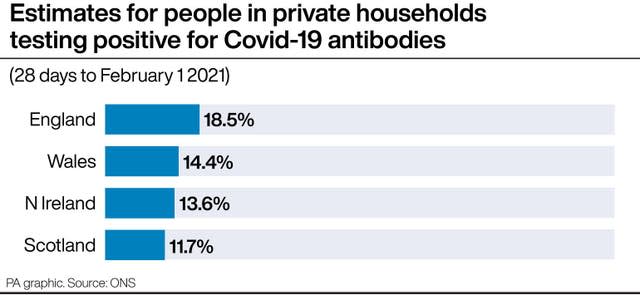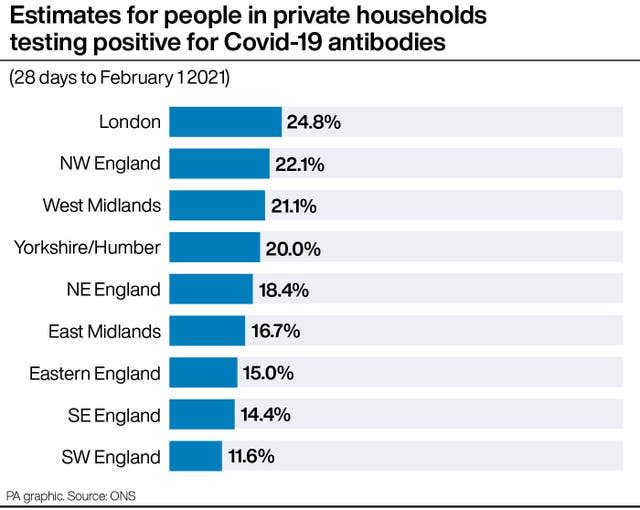Chart shows which age group is most likely to have COVID antibodies in England
The number of people who have antibodies for the virus which causes COVID-19 has increased across the UK, but there is “substantial variation”, new figures show.
Having antibodies in the blood indicates that people have either previously been infected with the virus or have had a COVID-19 vaccine.
The Office for National Statistics (ONS) said that in England an estimated one in five adults would have tested positive for antibodies against the virus on a blood test in the 28 days up to February 1.
This compares to one in seven in Wales and Northern Ireland and an estimated one in nine in Scotland.
Older people were more likely to have antibodies in England. But in Scotland, Wales and Northern Ireland the highest rates were seen among younger adults.
The increasing number of people with antibodies reflect the effect of the vaccine programme as well as the high levels of infection seen in recent months, the ONS suggested.
The chart below shows a significant proportion of over-80s had antibodies when the tests were carried out - which reflects the rolling out of the vaccine.
More than a quarter (25.9%) of adults aged 16-24 also had antibodies, though this is almost entirely down to the level of infections because so few will have received the vaccine yet.
It comes as officials told nearly two million more people were told to shield to protect themselves from serious side-effects of COVID-19.
Watch: How the UK hit its 15 million vaccination milestone
A new tool has identified those who are at high risk of severe disease or death.
As a result, 1.7 million additional people in England will be sent letters asking them to shield.
Around 2.2 million people are currently on the list in England, which will expand to almost four million when the additional people are included.
More than 800,000 of these are aged 19 to 69 and will be prioritised for the vaccination programme, the Department of Health and Social Care confirmed.
It comes as new evidence suggests that the COVID-19 vaccination programme is working as increasing numbers of people are showing protective antibodies in their blood.
Antibodies – disease fighting proteins made by the body’s immune system – are present in a person’s blood when they have built up some level of immunity through a previous infection or have received a vaccine.
In other developments:
Separate ONS data show the number of weekly registered deaths involving coronavirus in England and Wales has fallen for the first time since Christmas.
But figures also show that more than 1,000 COVID-19 deaths occurred each day for 23 days in a row in the UK in January.
Scientists have identified another new variant of coronavirus which has potentially concerning mutations. Public Health England has identified 38 cases of “variant under investigation” known as B.1.525.
First minister Nicola Sturgeon announced that some pupils in Scotland will return to school from 22 February but the stay-at-home lockdown order will continue until at least the beginning of March and possibly longer.
Speaking about the ONS findings, Esther Sutherland, principal statistician for the COVID-19 Infection Survey, said: “Antibody positivity rates have increased across all four nations and the effects of the vaccination programmes have begun to appear, especially in the older age groups.

“In England those aged 80 and over currently have the highest percentage of antibody positivity, most likely due to the high vaccination rate in this group.
“In Wales and Scotland those aged 16 to 24 years old have the highest percentage and in Northern Ireland it’s in 25 to 34-year-olds.
“We would expect younger groups to have high levels of antibody positivity after the period of high infection rates we have seen in the last few months.
“We will continue to closely monitor antibodies as the UK vaccination programmes continue to be rolled out.”
The ONS said that there was “substantial variation” in antibody positivity between regions in England.
In London, almost one in four people are estimated to have antibodies (24.8%) compared to almost one in eight in the South West (11.6%).
Some 22.1% were thought to have antibodies in the North West, followed by the West Midlands (21.1%) and Yorkshire and the Humber (20.0%).
The North East fell in the middle of the table with 18.4%, followed by the East Midlands (16.7%), Eastern England (15.0%) and the South East (14.5%).

There also appears to be varying rates of antibody positivity in the elderly across the four nations – though the researchers cautioned the figures only relate to those living in private households so will not reflect those in care homes.
In England, there were 40.9% of people aged 80 years and over testing positive for antibodies, while in Wales this figure was 12.7% and in Scotland the figure was 11.6%.
The data for Northern Ireland includes those over the age of 70 and 9.1% of this group are estimated to have antibodies for the virus.
The data show that for all age groups
In England, an estimated 18.5% of the population have antibodies, or 8.3 million people over the age of 16.
In Wales, an estimated 14.4% of the population have antibodies, or 365,000 people over the age of 16.
In Northern Ireland an estimated 13.6% of the population have antibodies, or 201,000 people over the age of 16.
In Scotland an estimated 11.7% of the population have antibodies, or 521,000 people over the age of 16.
Watch: How might the road map out of lockdown look?

 Yahoo Finance
Yahoo Finance 